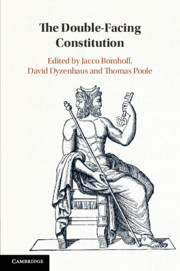Book contents
- The Double-Facing Constitution
- The Double-Facing Constitution
- Copyright page
- Contents
- Contributors
- 1 Introduction
- Part I Theoretical Foundations
- Part II Border Crossings: Comity and Mobility
- 7 The Spectre of Comity
- 8 Constitutionalism and Mobility: Expulsion and Escape among Partial Constitutional Orders
- 9 The Inside-Out Constitution
- 10 The Constitution in the Shadow of the Immigration State
- Part III The Foreign in Foreign Relations Law
- Index
8 - Constitutionalism and Mobility: Expulsion and Escape among Partial Constitutional Orders
from Part II - Border Crossings: Comity and Mobility
Published online by Cambridge University Press: 17 January 2020
- The Double-Facing Constitution
- The Double-Facing Constitution
- Copyright page
- Contents
- Contributors
- 1 Introduction
- Part I Theoretical Foundations
- Part II Border Crossings: Comity and Mobility
- 7 The Spectre of Comity
- 8 Constitutionalism and Mobility: Expulsion and Escape among Partial Constitutional Orders
- 9 The Inside-Out Constitution
- 10 The Constitution in the Shadow of the Immigration State
- Part III The Foreign in Foreign Relations Law
- Index
Summary
Jacco Bomhoff is principally concerned with the character of constitutionally salient boundaries. In its first part, this chapter explores the contrast between, on the one hand, recognition of the legally mediated character of borders and jurisdictional boundaries in critical scholarship, and, on the other hand, unquestioning determinations of ‘inside’ and ‘outside’ in judicial practice. The second part of this chapter, then, approaches the question of the character and effects of constitutional boundaries by way of a case study on mobility. Mobility, in its many different forms – its restriction and its excesses, for individuals and for corporations – lies at the heart of many pressing contemporary challenges. The legal treatment of mobility, however, is fragmented across many different specialised fields – from immigration law, to tax law, to international arbitration – in which constitutionalist concerns are rarely central. The chapter aims to address this lacuna by sketching the contours of an ‘outward-facing constitutionalism’ which could provide the conceptual and normative means to scrutinise the constitutional implications of the regulation of ‘access’ and ‘exit’ for both individuals and corporate actors.
Keywords
- Type
- Chapter
- Information
- The Double-Facing Constitution , pp. 211 - 242Publisher: Cambridge University PressPrint publication year: 2020

